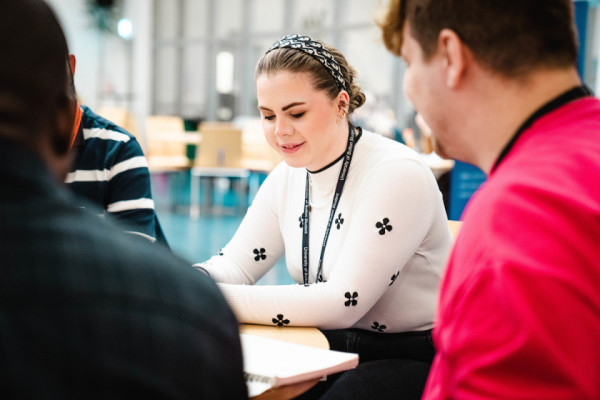
University of Bolton, Deane Road, Bolton. BL3 5AB
Tel:
Email:


“At the University of Bolton, we take great pride in providing a quality, supportive learning environment for our students.”
Professor George E Holmes DL | President & Vice Chancellor
“...tutors are very supportive and you’re not just a student ID number, at this university you are an individual with a name.”
Ellisse Vernon | BSc (Hons) Adult Nursing
Back to menu
Back to menu
Study with an Off-Campus Partner
Back to menu
Back to menu
University of Bolton, why we are the right choice
Location - Bolton, Greater Manchester

01/12/2021
Anxious about teaching? Here’s a complete guide on how to survive (and thrive) during your PGCE!
Postgraduate degrees can often be more challenging than undergraduate degrees, as they are more intensive and require a lot of self-discipline. This is certainly the case when it comes to teaching, with PGCEs demanding a great deal of commitment from students.
On your PGCE, you’ll have a mix of both practical teacher training and academic study. This means you’ll be juggling your normal lectures and classes with real life work experience. So your ability to learn on the job is key. For some, it may feel like sink or swim time, but at the University of Bolton we are always there to support trainee teachers in navigating their first placements.
As well as our continued help and guidance, there are a few tips and tricks to ensure you make the most of your PGCE. Here’s a complete teacher training guide/survival guide for success, and not stress.
When it comes to optimising your study style during your PGCE degree, it’s important to know what works for you. For most people, it helps to mix things up. While self-study can be more flexible to your busy schedule and helps you build routine and discipline, group study also has its benefits.
This is why it’s vital to have people around you that you can trust and turn to. Studying in groups of two or more can open up a world of possibilities, giving you an easy way to learn more about topics you’re not confident about, as well as providing a sounding board for ideas.
When PGCE students collaborate, they get to train their teamwork skills while building each other’s confidence. Here are some tips for making group study work for you:
- Get an assignment buddy who can help you proof-read and double-check your work
- Schedule group study if you find it helpful, but make sure you have enough self-study time away from others
- Don’t get stuck in a rut with one study style. If studying with friends is too disruptive, hit the pause button or opt out altogether. Not everyone is suited to studying together
As well as figuring out your own study style, you will also need to be extremely organised. With different classes and assignments to juggle, a week view planner will become your best friend. Always know what the week ahead looks like, and leave yourself enough time to plan.

No person is an island. This is especially true when it comes to the teaching profession. In fact, as you embark in your PGCE teaching placements, you’ll quickly realise the importance of camaraderie in the teacher’s staff room! It’s not just a place for having a chat over tea and biscuits, but it’s a safe zone to air frustrations, exchange ideas and build a network of support.
During your PGCE placement, don’t become a classroom hermit during breaks and lunch hours. Make sure you go to the staffroom and make friends with other teachers. Having experienced professionals around you is essential for your survival, and will keep you sane even when your workload is heavy.
Besides, PGCE pals can last a lifetime and you never know who you may end up working with in the future. Being able to socialise and have a bit of fun during your training can drastically improve your mental health and wellbeing too. This is why any teacher training guide/survival guide should never be without a social element.
Whether it’s a quick cup of coffee or an evening out to celebrate the end of your placement, make time to attend.
Making the most of placements is super important if you want to be successful as a teacher. The practical training you do in your PGCE year shapes you, and your future career path.
This is the time to break out of your shell and step outside of your comfort zone. So you need to be prepared to push yourself. One tip for fully embracing PGCE teaching placements is to disregard those thoughts and feelings of fear when it comes to the classroom. Feel the fear and do it anyway!
Teacher training is a chance for you to experiment. There’s no better time to trial your teaching skills and methods. You’ll find out first-hand what works, and what doesn’t. You’ll also get the opportunity to receive constructive feedback from mentors and course leaders. So don’t be afraid of failing. Let it happen, and learn from it.
If you want to make the learnings from your placements go further, make sure you do the following:
- Allocate enough time for lesson planning and have a longer term strategy for how you are going to approach your placement
- Don’t avoid parent contact during your placement, and try to get as much exposure to real life situations as possible
- Be prepared to work autonomously at times, but always ask for feedback (even if it isn’t provided to you)
- Get involved in activities beyond the school day, such as extra-curricular clubs and activities. This is the time to increase your visibility as a potential candidate, and a chance to soak up every aspect of school life

Time management can be one of the toughest parts of PGCE teaching. This is because the practical work experience inside a classroom can take a lot out of you, and it may leave you feeling overwhelmed at times.
On top of this, you’re also juggling other aspects of university, including shared house responsibilities or family life, as well as your social life and having enough time for exercise, relaxation and self-care.
If you feel yourself struggling to tick things off your ‘to do’ list, one of the easiest ways to simplify your list of tasks is to apply prioritisation. You can do this with the Eisenhower Method. This method helps to determine which of your tasks are the most important, which can be delegated to others, and which ones can be eliminated altogether.

By using this method, it’s easy to immediately see which tasks have to be done straight away, and which ones can be scheduled in at a later date. Remember to also ask for help when things are getting on top of you, and be willing to delegate to friends, family or housemates. Just remember to ask nicely and be sure to help them out in return when they need you.
At the University of Bolton, we put students and their needs first. Our student-centric approach ensures that we can deliver the right help and support, no matter what stage you’re at in your education or training.
We believe that a good work/life balance is essential when embarking on a teaching degree. So we always advise students to make sure they have enough time to wind down, relax at the end of the day, and allocate set hours each week for exercise.
Not only does physical activity improve memory and cognitive function, but it’s an excellent stress buster! The same endorphins that make you feel better about yourself also keep your mind sharp and help you concentrate, so exercise is highly beneficial for your studies.
Plus, increasing your heart rate several times a week can give you a get-up-and-go attitude, which we all know is fundamental for working in a classroom environment.
Looking after your mental health is key during your degree. If you feel yourself getting stuck in a rut, or feel overwhelmed with university life, talk to friends and family and seek advice. Simply talking to others can assist in relieving feelings of stress, anxiety or hopelessness.
You can also turn to our award-winning Student Support Team, who are also there to provide guidance on a number of matters.
Or you can use the University of Bolton’s Counselling Service on-campus, we offer the following inside our Life Lounge:
- Mental health advisors
- Cognitive Behavioural Therapy clinic
- Professional counselling
So don’t ever feel like you have to face your problems alone. If you ever need someone impartial to talk, or you require professional advice in managing anxiety and stress, our team is here to help.
Are you interested in applying for our PGCE programmes? With our simple teacher training guide, and the help of our passionate faculty, you’ll be on the right path to success!
We offer a range of primary, secondary and higher education teacher training courses, and our teaching degrees are some of the best in the UK, giving you a competitive edge when you graduate.
We’re in the Top 10 in the UK for Student Satisfaction in Education Courses*, and we are one of the largest teacher education providers, with excellent graduate employment rates. We also have a diverse, friendly and supportive campus, where inclusivity is a top priority, so there’s nowhere better to begin your journey into teaching.
To find out more about applying for PGCE teaching degrees in 2022, see our available courses.
*Complete University Guide, 2022